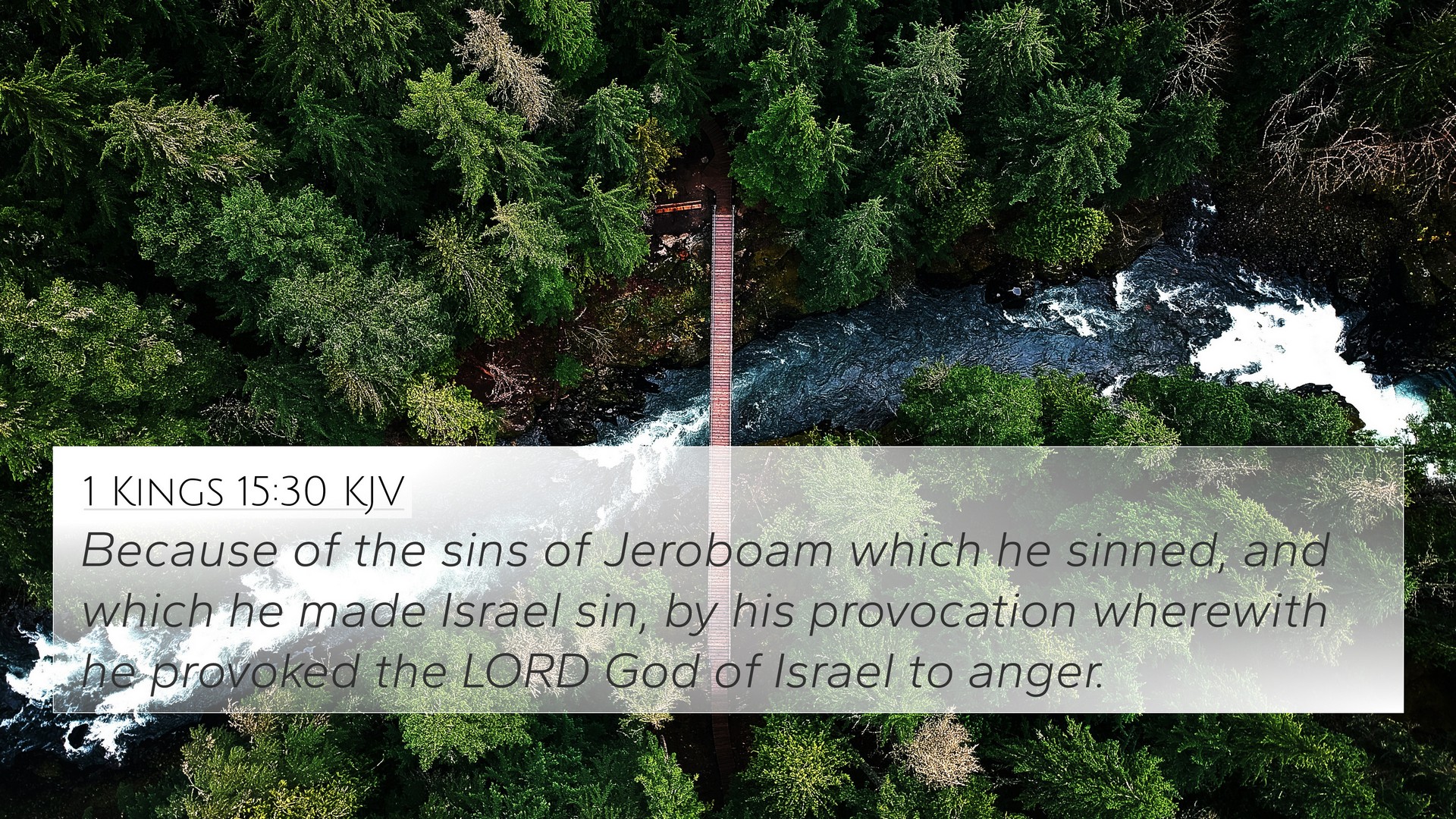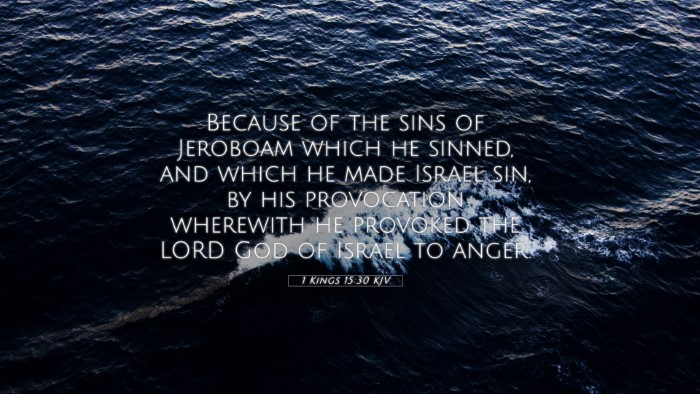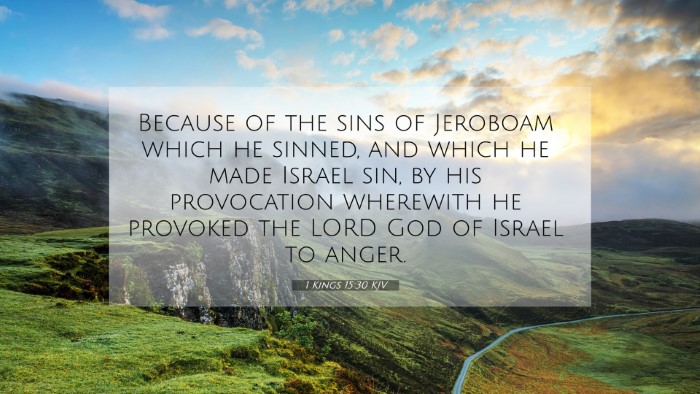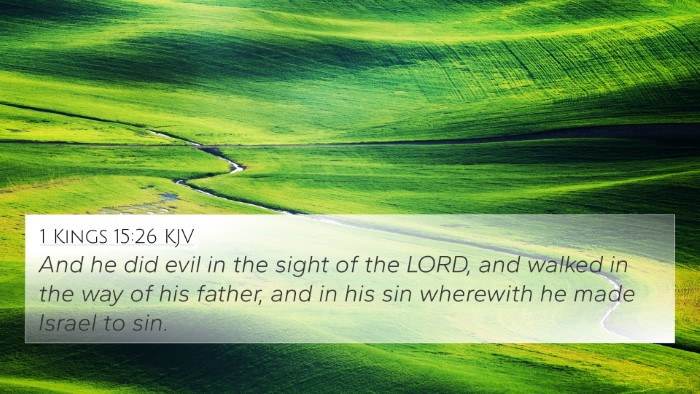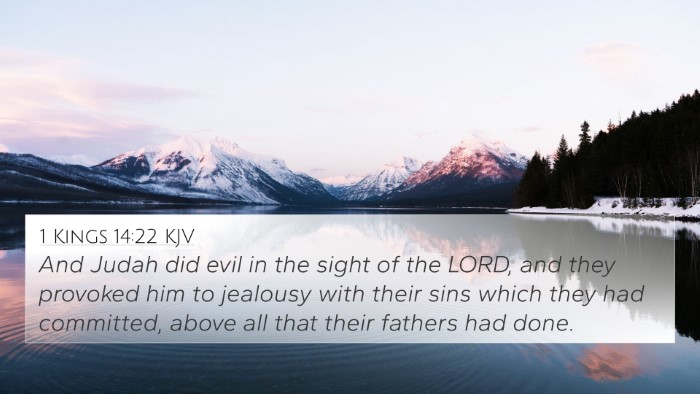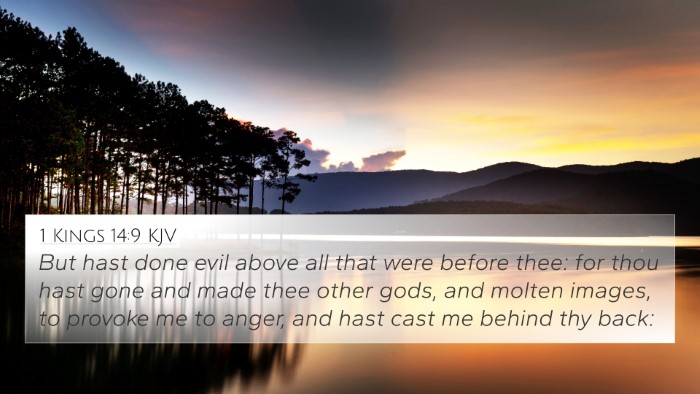Understanding 1 Kings 15:30
Bible Verse: 1 Kings 15:30 - "And it was because of the sins of Jeroboam which he sinned, and which he made Israel sin, that the LORD his God removed him out of his kingdom, and gave it to another, even to Baasha the son of Ahijah."
Summary of Meaning
This verse serves as a pivotal moment in the history of Israel, emphasizing the consequences of sin, particularly in leadership. The actions of Jeroboam had significant repercussions not only for himself but for all of Israel. The sin described here refers specifically to Jeroboam's idolatry and leading the people away from true worship of Yahweh. This passage highlights God's sovereignty in judgment and His willingness to remove an unfaithful king.
Insights from Public Domain Commentaries
Matthew Henry
Matthew Henry reflects on the gravity of Jeroboam's sin, underscoring how a leader's actions can lead an entire nation astray. Henry points out that Jeroboam's sins were not just personal failings but systemic issues that affected all of Israel, illustrating the danger of leading others into idolatry. He emphasizes God's justice in addressing these transgressions through the removal of Jeroboam’s rule.
Albert Barnes
Albert Barnes explains that Jeroboam's actions were particularly egregious as he intentionally led the nation into idolatry, a direct violation of the covenant with God. Barnes notes that God’s decision to take the kingdom away from Jeroboam demonstrates the principle that God holds leaders accountable for their influence over others, reaffirming the importance of righteousness in governance.
Adam Clarke
Adam Clarke provides additional context, linking the passage to the broader theme of divine judgment in Scripture. He emphasizes that the narrative serves as a warning to future leaders about the dangers of turning away from God. Clarke identifies Baasha's rise as an example of divine retribution for Jeroboam's persistent unfaithfulness, highlighting the continuity of God’s plan and judgment throughout Israel's history.
Bible Cross-References
- 1 Kings 14:10-16: God's judgment upon Jeroboam for his idolatry.
- 2 Kings 10:29-31: The continuation of idolatry in Israel leading to further judgment.
- 1 Chronicles 10:13-14: The consequences faced by Saul for forsaking God.
- Hosea 1:4: Prophecy illustrating God's rejection of Jeroboam's lineage.
- Exodus 20:3-5: The commandment against idolatry which Jeroboam violated.
- 1 Kings 12:28-30: Jeroboam's establishment of golden calves as idols.
- 2 Chronicles 11:14-15: The division of Israel and the influence of false priests.
Theological Themes
This verse touches on several key theological themes:
- Divine Judgment: The principle that God judges sin, especially when it leads others astray.
- Leadership Accountability: The responsibility leaders have for the actions and spiritual direction of those they govern.
- The Sovereignty of God: How God orchestrates events to fulfill His purposes, even using the unfaithfulness of leaders.
Connections to Other Bible Verses
Understanding 1 Kings 15:30 requires examining connections between various Scriptures, enhancing our insight into God’s will and the consequences of disobedience:
- Proverbs 14:34: "Righteousness exalts a nation, but sin is a reproach to any people."
- Galatians 6:7: "Do not be deceived: God is not mocked, for whatever one sows, that will he also reap."
- Matthew 12:36-37: Emphasizing accountability for words and deeds.
- Romans 13:1: The importance of authority ordained by God and its accountability.
Important Comparisons and Inter-Biblical Dialogue
1 Kings 15:30 serves as a vital link in understanding the broader narrative of sin and judgment in the Bible. The connections between various Biblical texts illustrate the consistent theme of God's righteousness and justice:
- Analyzing the consequences of Jeroboam's actions helps identify similar themes in the lives of other leaders like Saul and David.
- The relationship between the Old and New Testament teachings on sin and repentance is highlighted through the example of Jeroboam.
Conclusion
In summary, 1 Kings 15:30 provides critical insights into the nature of sin, leadership, and divine judgment. The commentaries by Matthew Henry, Albert Barnes, and Adam Clarke enhance our understanding, while the cross-references draw connections to other significant Biblical passages. Emphasizing a cross-referencing approach enriches the study of Scripture and aids in identifying recurring themes throughout both the Old and New Testaments, guiding believers in their spiritual walk.
Further Study Directions
For those seeking to deepen their understanding of 1 Kings 15:30 and its implications:
- Engage with Bible concordance tools to explore related verses about sin and judgment.
- Consider using a Bible cross-reference guide to find thematic connections in the context of leadership and accountability.
- Investigate cross-reference Bible study methods for a more comprehensive analysis of Biblical texts.
